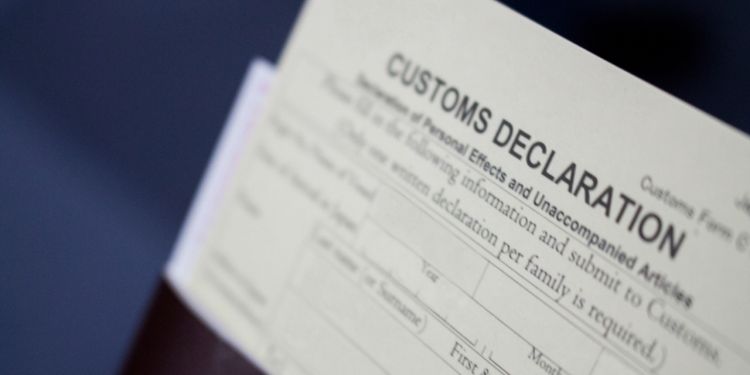
As you embark on your expatriate journey to the picturesque shores of Mauritius, navigating the intricacies of customs and import regulations becomes paramount. This article guides you through the bureaucratic landscape, detailing the procedures, tariffs, and customs duties associated with bringing goods into the country.

Documents required for the importation of personal goods in Mauritius
Once your container arrives in Mauritius, you will be contacted by the Mauritius Revenue Authority to complete the legal formalities. You will need to present:
- Your passport;
- Your Occupation Permit or pre-approval document;
- The list of imported goods (packing list);
- Declaration of value of goods;
- Carrier's invoice;
- Any other relevant document/permit required by local authorities (veterinary, agriculture, health, etc.).
The time frame for the recovery of the goods in Mauritius
Regarding the recovery of personal items upon arrival, when all requested documents are submitted in a timely manner, and all possible fees are paid, it takes:
- 4-5 business days for ocean freight;
- 1-2 business days for air freight.
Good to know:
If you are unable to present your Occupation Permit or approval document, the authorities will ask you to deposit a bank guarantee until you can do so. They may also require a deposit to clear your goods through customs.
Goods authorized, prohibited, or subject to authorization in Mauritius
As elsewhere in the world, importation of some products is allowed, while others are prohibited or subject to official authorization.
To ensure that shippers comply with the law, all shipments of goods, including household goods, by sea and air, are subject to a thorough customs inspection before being released to the owner by Mauritian Customs.
Duty-free and import clearance-free goods
Apart from appropriate clothing and personal effects, foreign nationals traveling to Mauritius are allowed to import freely and tax-free personal items already in use, namely:
- A portable musical instrument;
- A personal music player, MP3 and/or image recorder;
- A portable radio receiver;
- A portable video camera;
- A camera;
- One bicycle;
- One windsurfing board and up to 3 matching sails;
- Fishing equipment (excluding any type of underwater fishing weapon);
- Diving equipment, golf.
The above items must be re-exported within 6 months of importation. If not, duties and taxes will be due.
Products subject to authorization
The import of certain products is subject to strict regulations, often requiring a permit prior to importation. Here are some examples:
- Species and products protected under CITES. A permit is necessary for the import of these items;
- Plants and their derivatives, including fruits, vegetables, and seeds, necessitate authorization from the Ministry of Agro-Industry and Food Safety;
- Pets require an import permit from the Veterinary Service of the Ministry of Agro-Industry and Food Safety before being brought into the country;
- Firearms and weapons mandate an import permit from the Mauritius Police.
Good to know:
Flower boxes sold at airports have a phytosanitary certificate authorizing their import/export. Unless used in a professional context, weapons (war, hunting, underwater fishing), as well as ammunition, are prohibited from being imported into Mauritius.
Products prohibited for import
The importation of the following items is prohibited:
- Rolling papers;
- Counterfeit products;
- Obscene articles and publications;
- Sugar cane cuttings and plants;
- Drugs;
- Prohibited weapons, including switchblades, cane swords, truncheons, and any weapon designed to give the appearance of another object.
Products subject to authorization
The following products are subject to authorization prior to importation:
- Products of animal origin;
- Live animals.
Important:
Drugs in all forms are prohibited, their importation is illegal, and trafficking is severely punished by law. Soft drugs are not legal in Mauritius. The possession of rolling papers is also prohibited. Failure to declare prohibited products or products subject to prior authorization to customs is a serious offense; offenders are liable to a fine or even imprisonment, and the products are immediately seized.
Authorized duty-free products
There are specific limits and regulations for the importation of certain goods into Mauritius:
Tobacco limit: For travelers aged 18 and over:
- 250 grams of tobacco and tobacco products, such as cigarettes and cigars.
Alcohol imports: For travelers aged 18 and over:
- 2 liters of hard liquor and 4 liters of wine and beer.
Cash limit: Currency valued at more than Rs 500,000 must be declared to customs.
Other goods:
- Personal medication must be accompanied by a prescription issued by a medical practitioner;
- Residents aged 12 and over may import personal effects worth up to Rs 15,000;
- Residents under 12 and non-residents of any age may import personal goods up to a value of Rs 7,500.
Delivery of orders from abroad in Mauritius
It is possible to order online from Mauritius. Most foreign merchants deliver on the island. So, how to receive deliveries safely, and in what conditions?
E-commerce websites that deliver to Mauritius
Regarding the leading e-commerce platforms, such as Amazon, AliExpress, or eBay: the first one is a UPS partner, and the second and third send the packages directly by post at your nearest post office, where you will be charged a postage fee of Rs 40 to collect them. For those who do not deliver in Mauritius or who charge very high shipping costs, you have the option of using other shipping companies.
Shipping companies in Mauritius
Currently, Mauritius has several shipping companies that will allow you to receive your orders safely. The main ones are:
- Mauritius Post;
- DHL Express;
- FedEx;
- UPS Express (represented locally by Velogic);
- TNT.
Customs fees in Mauritius
The tax and VAT regulations in Mauritius are outlined as follows:
- Products valued below Rs 1,000 are exempt from tax and VAT;
- For items valued between Rs 1,000 and Rs 10,000, a standard 15% VAT is typically applicable;
- Products exceeding Rs 10,000 require customs clearance through a brokerage company, as direct collection by Mauritius Post is not allowed.
Customs clearance fees:
Items over Rs 10,000 may incur brokerage fees in addition to VAT and possibly customs duties.
Specific customs duties:
- Handbags made of textiles or plastic sheeting are subject to a 30% customs duty unless made of leather;
- Crockery and kitchen utensils are subject to a 15% tax in addition to the standard VAT applied to all products.
Unsolicited items:
- For unsolicited items, such as gifts from relatives abroad, VAT is not applicable if their value is below Rs 1,000;
- If the value exceeds Rs 1,000, VAT is calculated on the item's value minus the Rs 1,000 allowance.
Customs duties vs. VAT:
- Customs duties are levied solely on the item's value, excluding shipping costs;
- VAT is applied to the total price paid, encompassing shipping and insurance costs. Understanding these regulations is crucial for individuals importing items into Mauritius, as it helps determine the applicable taxes and duties based on the value and nature of the products.
Good to know:
Mauritius has a secure framework for online shopping. Indeed, e-commerce operates in accordance with the Electronic Transactions Act of 2000.
Useful addresses & links:
Customs Department, Port Louis
Phone: (230) 202 05 00 / 01
Web: MRA
Department of Agriculture, Réduit
Phone: (230) 401 2800
Fax : (230) 464 8749
Web: Agriculture
We do our best to provide accurate and up to date information. However, if you have noticed any inaccuracies in this article, please let us know in the comments section below.









